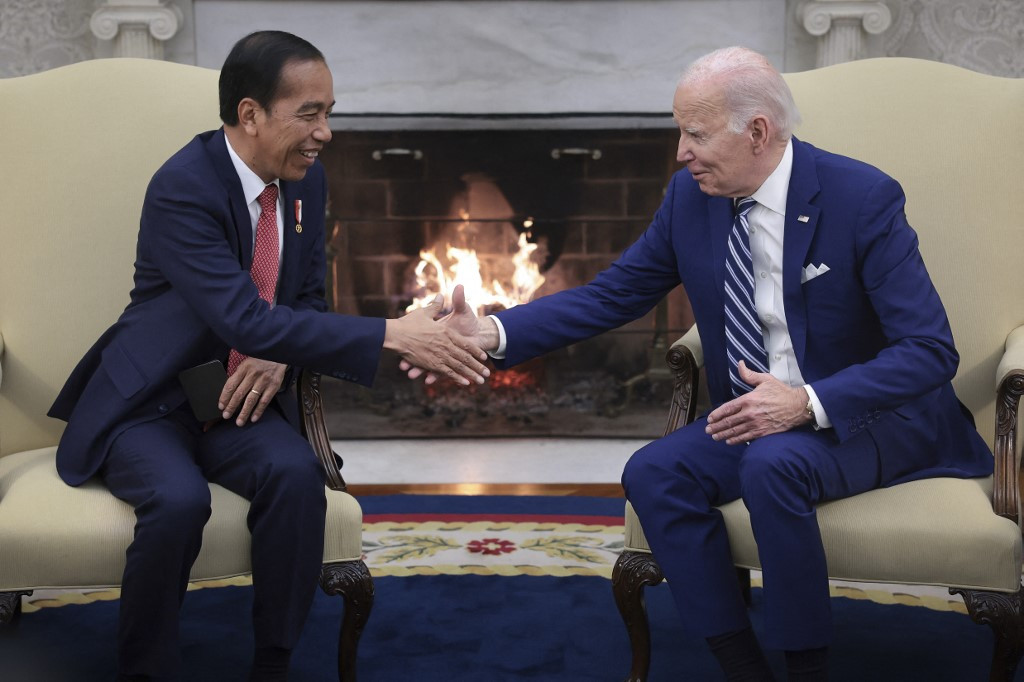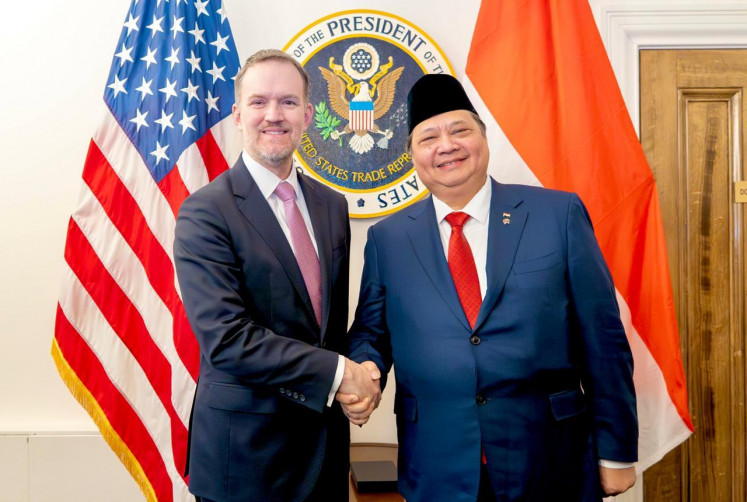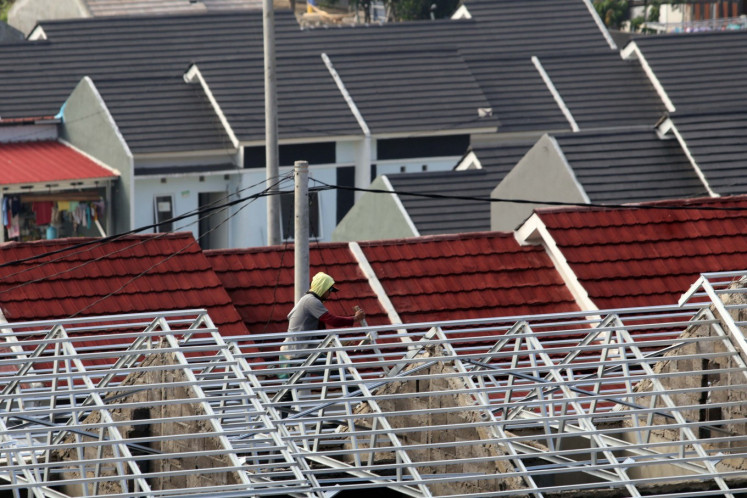Popular Reads
Top Results
Can't find what you're looking for?
View all search resultsPopular Reads
Top Results
Can't find what you're looking for?
View all search resultsIndonesia is simply overconfident on US trade deal
For sure, Indonesia and other ASEAN members need the US market, but like it or not the Biden administration has to follow the protectionist “America First” policy that typified the previous administration of Donald Trump.
Change text size
Gift Premium Articles
to Anyone
 President Joko “Jokowi“ Widodo (left) shakes hands with United States President Joe Biden in the Oval Office of the White House on Nov. 13, 2023 in Washington, DC. Biden and Jokowi discussed a range of bilateral issues during their meeting. (-/Win McNamee/Getty Images North America/Getty Images via AFP)
President Joko “Jokowi“ Widodo (left) shakes hands with United States President Joe Biden in the Oval Office of the White House on Nov. 13, 2023 in Washington, DC. Biden and Jokowi discussed a range of bilateral issues during their meeting. (-/Win McNamee/Getty Images North America/Getty Images via AFP)
P
resident Joko “Jokowi” Widodo and his entourage evidently expected too much from the bilateral talks with United States President Joe Biden at the White House on Monday and the Asia-Pacific Economic Cooperation (APEC) Summit in San Francisco on Tuesday. This overconfidence resulted in Indonesia’s failure to get what it had dreamed of for a long time.
I am sure that the Indonesian Embassy in Washington, DC had briefed the VVIP delegation about US domestic politics, including the growing power of labor organizations and the public tendency to become more inward-looking and the reluctance to give any “unnecessary” economic access and advantages to other countries, even to their most strategic partners and allies.
Indonesian officials seemed to ignore the real outlook and believed Indonesia was so strategic for the Biden administration that it would reward Jokowi with what he wanted, especially market access for Indonesia’s products. The attitude of a young Indonesian economist accurately reflected Jokowi’s optimism.
This economist, who has a vast network among government officials and even ministers, had expressed his belief that Indonesia would reap benefits, including an agreement on partnership in critical minerals, from Biden’s Indo-Pacific Economic Partnership (IPEF) scheme. The economist easily dismissed the arguments of his less-elevated friends who insisted that the IPEF only looked good on paper.
“Our ministers are confident that we will gain a major concession during this week’s bilateral negotiation,” said the good-looking economist.
Reuters reported that President Jokowi and President Biden discussed ways to advance ”a potential minerals partnership aimed at stimulating trade in the electric vehicle [EV] battery metal nickel” at the Oval Office. Quoting a senior US official, the news agency predicted that formal negotiations on the partnership between the two countries could be discussed during their bilateral summit.
The bilateral meeting apparently strengthened the young economist’s optimistic outlook. He just smiled, trying to be polite to his older friends, when one of them argued that it would be much more productive for Indonesia to focus on the ASEAN-initiated Regional Comprehensive Economic Partnership (RCEP), the world’s largest binding trade pact.
The RCEP has been ratified by all its 15 members, the 10 members of ASEAN, plus China, Japan, Australia, South Korea and New Zealand. The US has refused to join this pact, while India has withdrawn.
Meanwhile, 13 countries have joined the IPEF, some of them are parties to the RCEP, including Indonesia. The White House claims the IPEF represents 40 percent of global gross domestic product and 28 percent of global trade in goods and services. But the IPEF is non-binding because it has not won US Congress approval.
Biden launched the IPEF in May last year, with its ambitious but impossible target of containing China’s influence in the Indo-Pacific region.
And the young economist believed that Coordinating Economic Minister Airlangga Hartarto would announce from San Francisco Indonesia’s success in obtaining access to the lucrative US market. His friends opted to remain quiet, although they knew that US politicians dare not open their markets to Indonesia ahead of next year’s election, for fear of a backlash especially from labor unions.
And a few days later on Nov. 15, The Jakarta Post carried a story on its front page titled “No deal on IPEF as trade pillar needs more talks”.
Indonesian officials were too naïve to believe that the US would give a red-carpet welcome to Indonesian exports.
This newspaper quoted Airlangga, who attended the IPEF ministerial-level negotiations, as saying in a statement on Wednesday “that the discussions on trade as the IPEF’s first pillar had not ‘reached the targeted resolution’ due to several issues requiring further discussions”.
What will be the conclusion? The IPEF has in effect collapsed because next year the US will hold an election and President Jokowi’s term will end.
The IPEF is based on four pillars, namely trade; supply chains; clean energy, decarbonization and infrastructure; and tax and anticorruption measures.
According to the Post, at the second IPEF ministerial meeting in May of this year, the parties had agreed on three of the four proposed pillars, supply chains (Pillar II), clean economy (Pillar III) and fair economy (Pillar IV). On Tuesday in San Francisco, however, Airlangga said he and his counterparts from the 13 other member countries only signed the supply chains agreement. It is game over, and Indonesia gained nothing, although the government still hopes the IPEF member states will move the agreement forward.
In my column in this paper “Biden’s new trade-pact offer is almost a laughingstock” on May 30, 2022, I predicted that the IPEF was doomed to fail because it is not a binding multilateral agreement and looked like a desperate attempt by the Biden administration to counter-balance the lucrative economic offers from China to ASEAN.
For sure, Indonesia and other ASEAN members need the US market, but like it or not the Biden administration has to follow the protectionist “America First” policy that typified the previous administration of Donald Trump.
President Jokowi and his encourage will return home this weekend. His ministers will probably prepare a defensive statement if the media asks about the IPEF talks.
One thing is certain, it simply does not make sense if all the Indonesian officials involved in the talks with their US counterparts had as inadequate an understanding of Washington’s perspective on the IPEF as the young and brilliant economist.
***
The writer is a senior editor at The Jakarta Post









